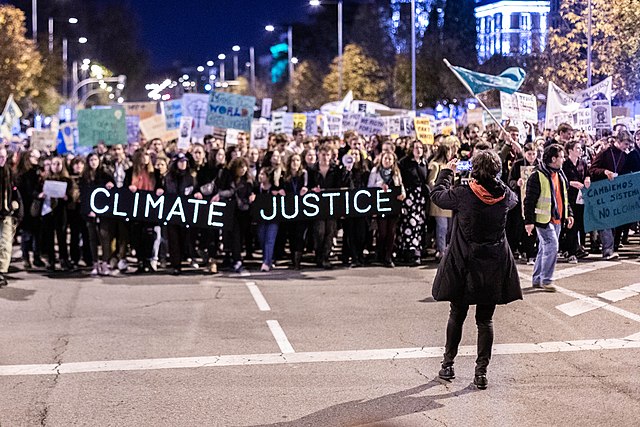
By Jessica Corbett
United Nations Secretary-General António Guterres on Sunday issued a statement emphasizing the importance of ambitious climate action after officials at a Group of 20 summit failed to reach an agreement for a communiqué just 100 days away from a major U.N. conference in Glasgow.
“The world urgently needs a clear and unambiguous commitment to the 1.5 degree goal of the Paris agreement from all G20 nations.”
—U.N. Secretary-General António Guterres
“The world urgently needs a clear and unambiguous commitment to the 1.5 degree goal of the Paris agreement from all G20 nations,” said Guterres. “There is no pathway to this goal without the leadership of the G20.”
The G20 is made up of 19 of the world’s largest economies plus the European Union.
“This signal is desperately needed by the billions of people already on the frontlines of the climate crisis and by markets, investors, and industry who require certainty that a net-zero climate resilient future is inevitable,” Guterres continued.
“Science tells us that in order to meet this ambitious, yet achievable goal, the world must achieve carbon neutrality before 2050 and cut dangerous greenhouse gas (GHG) emissions by 45% by 2030 from 2010 levels,” he added. “But we are way off track.”
The G20 communiqué (pdf) on energy transition and climate sustainability was ultimately released this weekend following meetings on Thursday and Friday in Naples. Reutersreported Friday that the countries couldn’t agree on language related to phasing out coal power—which was confirmed in the G20 presidency statement (pdf) that also noted fossil fuel subsidies.
Italy holds the G20’s rotating presidency and Roberto Cingolani, the country’s ecological transition minister, chaired the Naples event. According to Reuters, Cingolani specifically highlighted difficult negotiations with China, India, and Russia.
Cingolani also told reporters that the disputed issues will now be discussed at the G20 summit in Rome on October 30 and 31. The two-week U.N. Climate Change Conference (COP 26), which was delayed due to the Covid-19 pandemic, is also set to kick off on the last day of October.
“It is frustrating that despite the progress made by some countries, there was no consensus in Naples to confine coal to history,” said Alok Sharma, COP 26’s president-designate, in a statement Friday. “But I remain hopeful about the prospect of countries taking up this issue at the G20 Leaders’ Summit in October.”
“Countries on the frontline of climate change have laid out a clear call to action,” Sharma added, “and the G20 needs to respond to their moral authority and leadership, with ambitious climate action that keeps the 1.5 limit alive.”
Guterres on Sunday issued specific calls related to meeting the 1.5°C target.
“With less than 100 days left before COP 26,” he said, “I urge all G20 and other leaders to commit to net zero by mid-century, present more ambitious 2030 national climate plans, and deliver on concrete policies and actions aligned with a net-zero future including no new coal after 2021, phasing out fossil fuel subsidies, and agreeing to a minimum international carbon pricing floor as proposed by the [International Monetary Fund].”
The U.N. leader further called on the G7 and other wealthy countries to “deliver on a credible solidarity package of support” for countries in the Global South, including by meeting a $100 billion goal, increasing adaptation and resilience support to at least 50% of total climate finance, and adjusting the climate portfolios of public and multilateral development banks.
Guterres said that he intends to “use the opportunity of the upcoming U.N. General Assembly high-level session to bring leaders together to reach a political understanding on these critical elements of the package needed for Glasgow.”
The U.N. chief’s comments came in the midst of fires and floods around the world and as The Guardian reported on a new analysis from Paris Equity Check about how countries’ climate policies align with the 1.5°C goal:
The E.U. and U.K. have outlined emission pledges that could bring the world close to these aspirations. However, those of China, Russia, Brazil, and Australia—which remain reliant on continued fossil-fuel burning—would trigger temperature rises of 5°C if followed by the rest of the world. This dramatic discrepancy reveals a deep division over the energy and environment policies of the world’s richest nations.
Yann Robiou du Pont, the lead researcher for the analysis, told the newspaper that it “underlines what many of us fear: Major economies are simply not doing enough to tackle the climate crisis and, in many cases, G20 countries are leaving us on track [for] a world of more heatwaves, flooding, and extreme weather events.”
As WWF chief executive Tanya Steele put it: “Without more ambition from China, Brazil, Russia, and Australia, COP26 will fail to deliver the future our planet needs.”
Though U.S. President Joe Biden has won praise from some world leaders for rejoining the Paris agreement and pledging to halve the nation’s emissions by 2030, climate campaigners and experts continue to push his administration to go further, highlighting the United States’ wealth and unparalleled track record on generating GHG emissions.
Jessica Corbett is a staff writer for Common Dreams. Follow her on Twitter: @corbett_jessica.
Editor’s note: this article was originally published on Common Dreams
Image credit: European Greens



Leave a Reply